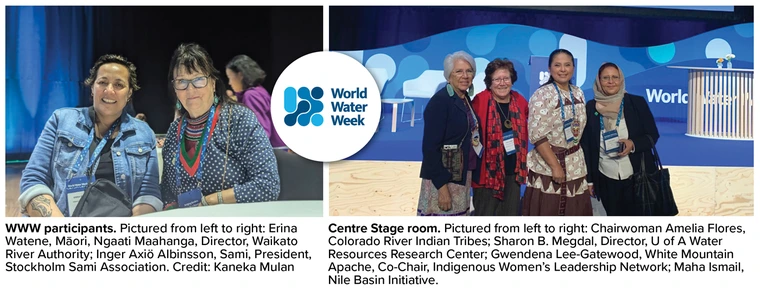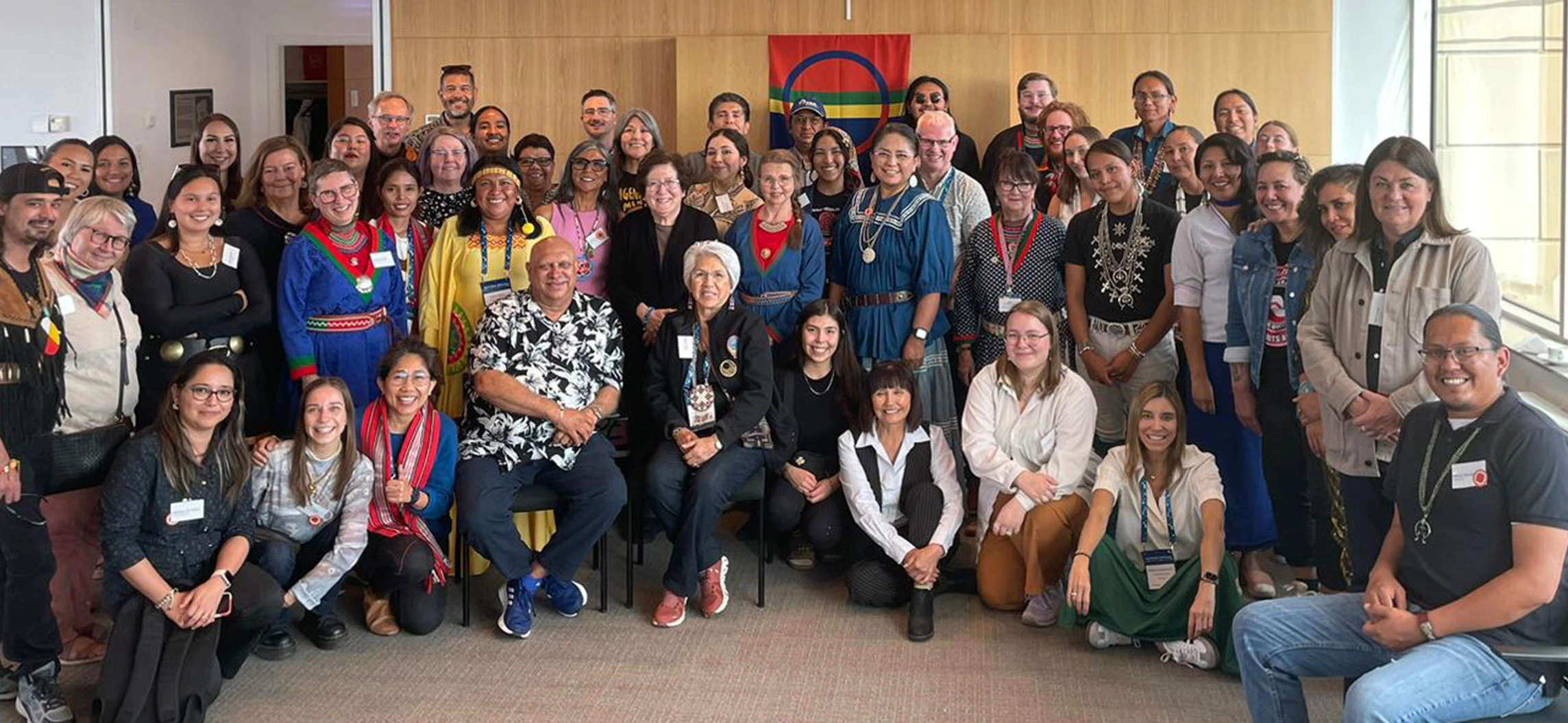
Information and story sharing exchange organized by the Stockholm Sami Association hosted by the Canadian Embassy, August 25, 2024.
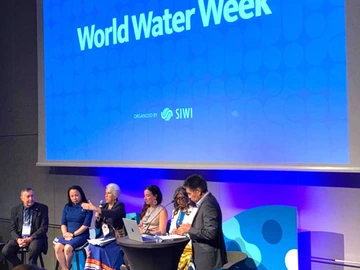
Colorado River Basin Panel, August 28, 2024. Pictured from left to right: Tom Buschatzke, Director, Arizona Department of Water Resources; Commissioner Camille Calimlim Touton, US Bureau of Reclamation; Chairwoman Amelia Flores, Colorado River Indian Tribes; Becky Mitchell, Colorado River Commissioner, State of Colorado; Vice Chairman Lorelei Cloud, Southern Ute Indian Tribe; and Session Moderator Daryl Vigil, Water & Tribes Initiative Co-Director, Jicarilla Apache Nation. Credit: Sharon B. Megdal
Bridging Borders: Water for a Peaceful and Sustainable Future was the theme of the 2024 Stockholm World Water Week conference. Organized by the Stockholm International Water Institute (SIWI), the conference attracted global participation with its variety of session formats and content. I very much value the opportunity to participate.
Particularly exciting this year was the elevation of Indigenous voices from around the world, including from the Colorado River Basin. I attended organized and informal sessions with Indigenous participants from the Colorado River Basin and elsewhere, who engaged in experience sharing and relationship-building. The meaningful learning and interactions facilitated by the amazingly welcoming Stockholm Sami Association were uniquely valuable. The commonality of Indigenous experiences across the globe reflects both injustices and opportunities. The value of pairing of Indigenous practices with Western science was highlighted. At the August 28 session, “Enabling Indigenous Peoples Participation: Perspectives from the Colorado River Basin,” Colorado River Basin leaders underscored how more inclusive consultation and decision making is not only overdue but necessary to maintaining the health of the Colorado River system. Essential processes called out by Indigenous voices – building and maintaining trust, listening to learn, and inclusivity – were emphasized throughout World Water Week.
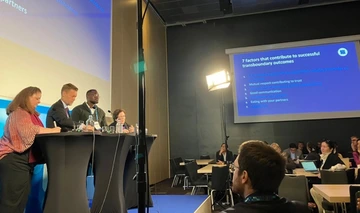
SIWI Seminar, August 27, 2024. Featured from left to right: Session Moderator Nancy Eslick, Global Water Coordinator, USAID; Dr. Anders Jagerskog, Programme Manager, Cooperation in International Waters in Africa (CIWA) Trust Fund, World Bank; Walter Chinangwa, Country Lead, Malawi, Water Witness International; Sharon B. Megdal, Director, U of A Water Resources Research Center. Credit: Yan Zheng
I also served as a panelist for one of the seminars organized by SIWI, which was co-convened by the UN Economic Commission for Europe, Water Witness International, World Bank Group (Water), Organization for Security and Co-operation in Europe, and the Ministry for Europe and Foreign Affairs of France. Each SIWI seminar consisted of three segments – a fully online segment, a hybrid segment, and an in-person only session. I spoke at the hybrid session, titled “Institutions for water, peace and cooperation - Part 2: Basins doing the work.” As at the Bali World Water Forum, I spoke about my experience working with and observing the International Boundary and Water Commission (IBWC) (US Section and Mexican Section). Within the context of the 1944 Water Treaty and pursuant to its terms, IBWC approves binational agreements on the sharing of surface waters, wastewater treatment, and some groundwater activities, including facilitating the Transboundary Aquifer Assessment Program. My remarks focused on factors that contribute to successful transboundary outcomes. These factors are (1) a functioning mechanism for cooperation that includes knowledge co-production, (2) mutual respect contributing to trust, (3) involvement of interested parties (stakeholders), (4) good communication, (5) persistence and patience, (6) eating with your partners, and (7) leadership. Although the most I could say in the limited amount of time offered by this content-rich session was a few words about each factor, the questions and feedback received indicate that it is indeed important to explore how cooperation is furthered. While I noted that these items “go without saying”, they need to be said. Building relationships and trust through eating with your partners received enthusiastic nodding of heads, as did co-producing knowledge through inclusive engagement and listening to learn. In response to a question, I noted that there are instances of committees or commissions that exist on paper but do not consistently function effectively. The IBWC’s structure and operations can serve as a model of an effective platform for sharing water across borders. Though they were based on IBWC structure and processes related to Colorado River Basin transboundary diplomacy, I argue that the enumerated factors contributing to successful diplomatic outcomes have broad applicability. The case study from which these remarks were drawn will be published in Handbook of Water Diplomacy, Shafiqul Islam, Kevin Smith, Martina Klimes, and Aaron Salzberg, eds., forthcoming from Routledge Press. While publication is pending, please contact me at smegdal@arizona.edu for an advance copy of my case study.
World Water Week has long recognized the accomplishments and importance of the younger generation. Through establishing the Junior Stockholm Water Prize as a companion to the long-standing Stockholm Water Prize and encouraging the involvement of younger speakers in its sessions, SIWI allows the voices of emerging and younger leaders to be heard. This was true for the opening session, where Aana Edmondson, board member for #Sáminuorra, the Sámi national youth organization, and Disa Crow Chief, Students Energy/Water Movement – Waterlution Young Water Ambassador, spoke for youth. In a separate talk, Aana and Phil Duncan, University of Canberra Galambany Professorial Fellow, offered additional perspectives. They emphasized these concepts: Listen; Respect what we have to say; Representation and Reciprocity are key; Leave preconceived conditions at the door; Think about quality of life; Embrace and Integrate the knowledge; Act together.
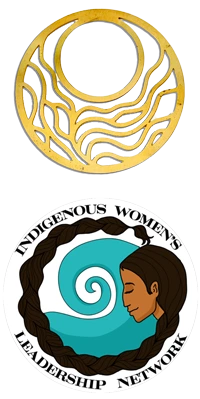
Present at Stockholm World Water Week were many representatives of the Women in Water Diplomacy Network. The clip worn by our members and supporters was noticeable throughout the week. Also visible was the Colorado River Basin's Indigenous Women’s Leadership Network – a program of the Water & Tribes Initiative, with two of the four co-chairs, Gwendena Lee-Gatewood (White Mountain Apache) and Darnella Melancon (Fort Yuma Quechan Indian Tribe) and staff lead Tahlia Bear (Fort McDowell Yavapai Nation), engaging in multiple ways. Several staff and youth representing Tó Nizhóní Ání from the Black Mesa of the Navajo Nation participated as well.
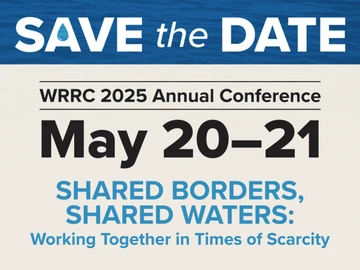
World Water Week’s focus on bridging across borders in multiple domains, including but not limited to formal and informal diplomacy at national and sub-national levels, data acquisition and sharing, and technology, is highly related to the WRRC’s 2025 Annual Conference, Shared Borders, Shared Waters: Working Together in Times of Scarcity. Please mark your calendars for what is sure to be a stimulating, content-rich conference, which will be held in Tucson, Arizona, on May 20-21, 2025, with non-interactive, free live-streaming available. Updates on the conference and other WRRC programming will be provided via the Weekly Wave e-News Digest.
Dialogues such as Stockholm World Water Week on the global stage and the WRRC Annual Conference on a more regional scale provide valuable opportunities to share lessons learned, both positive and negative. Indeed, there were examples of less-than-successful efforts at Stockholm World Water Week. However, as is my inclination, I would like to end these reflections on an optimistic note. I attended the “Meet the Laureate” session with the 2024 Stockholm Water Prize Laureate, Professor Taikan Oki of The University of Tokyo, and my take-aways from that session relate to communication, trust, and process. Communication with decision makers should include discussion of tradeoffs of policy options and foster understanding of consequences. Scientists and policy makers must listen to each other. Communication must be two-way and must stay on message. Trust must be established and maintained. (I cannot count the number of times the importance of trust was stressed throughout the week.) Regarding processes, Professor Oki mentioned that there are different ways to make change and change requires patience and optimism about the ability to transform. In the end, he offered the audience a useful reminder: focus positively on creating more resilient societies rather than looking at everything, including people, as problems. I suggest we heed these words.
